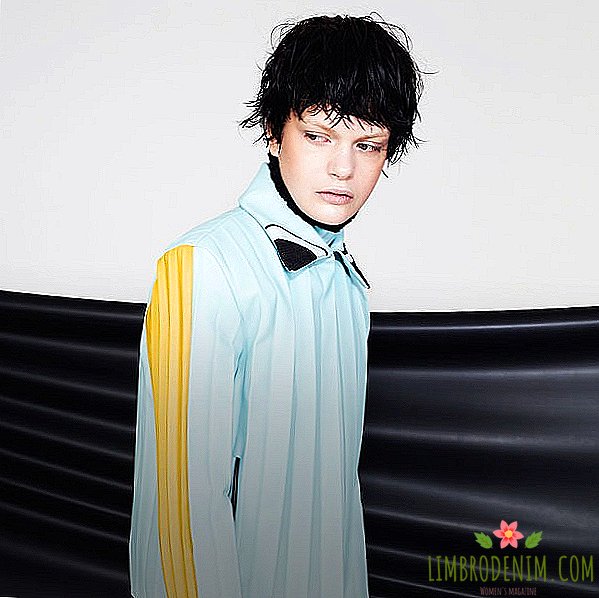You can not choose anything: How we adopted a child from Russia
Four and a half years ago the “law of Dima Yakovlev”, also known as the “law of scoundrels”, came into force: 420 deputies voted to prohibit American citizens from adopting Russian children. Six months later, Russia imposed a ban on adoption for several more Western countries, including Spain. By that time, in Catalonia alone, 223 families were waiting for their Russian children, and 48 of them were already familiar with the foster child.
Mary and David were lucky: they managed to jump into the last car of the departing train before all the adoptions to Spain were frozen. Now they, along with their son Max, live in a beautiful house not far from Barcelona. Max, who is almost six years old, has many friends, he studies in an international school, speaks three languages, and is engaged in swimming. About the most exciting journey in her life, Max's mother, Maria, told us.

Welcome

I am 44 years old, my husband David is 49, we are together seventeen years old, have been married eight of them. We met when we worked in the same company in the banking sector, only in different cities: I am in Valencia, he is in Madrid. Then we were both transferred to Barcelona, where we continued to communicate - and still together.
Adoption has always been for us one of the options, along with the usual biological parenting. Many of our friends and relatives became foster parents, so this path was completely natural for us. In the end, we failed to have a child in a biological way, and we finally decided to adopt. It is not simple and is associated with a sense of loss, even if you always perceived adoption as the norm. People need time to come to terms with the injustice of nature and go to the next level. It is very important to experience this in yourself and mourn, to find peace of mind. Adoption is a very delicate matter, not an easy one. In the head of the parent, everything must be in the proper order, otherwise you can easily lose yourself.
We decided to adopt a child from another country because of the timing. Adoption within Spain implies a long wait, eight to nine years, and when you contact the authorities, they almost directly recommend international adoption - at least that was the case before. In recent years, international adoption in Spain has become less popular due to the financial crisis and the closure of this opportunity in many countries, including China and Russia.
For us, it all started in December 2011 with an official request to the Catalan Institute of Guardianship and Adoption (The word Acolliment in the name of an organization means not so much guardianship as a joyful meeting, and can be translated as “welcome.” - Ed.). A few weeks after that, the process of obtaining the status of a foster parent began: we had to receive a certificate of "professional suitability" in this capacity, which is a prerequisite for adoption. The process takes about six months and includes a series of trainings, several personal interviews with psychologists and educators, as well as a visit by a social worker home. Plus we were given a list of books to read. Becoming parents, people should be ready to address a variety of issues - related to ethnic origin, gender, various diseases - and you need to know what to do with all this.
One of the conditions for adoption: you can not choose anything - only the country from which you want to adopt a child. In our case, it was Russia - simply because we already knew something about adoption from there, we had familiar families with children from Russia.

In addition, mathematically there was a greater chance that there would be a child for us in such a huge country - simply because of the size of the population. By that time, China was already closed for foreign adoption, while other smaller countries offered twenty to thirty children a year, so the waiting lists were prohibitively long.
We, of course, had doubts. We understood that everything would be very difficult from a bureaucratic point of view. Russia has very strict rules, it is necessary to prepare a lot more documents than in other countries. In addition, one cannot get away from formalism: each requested document must be provided in three copies, apostilled and certified by a notary. For example, a certificate of income from the company in which I work, you first had to sign in the personnel department, then assure the notary, and after apostilization - not to mention official translations into Russian.
But perhaps the most serious concern was the topic of fetal alcohol syndrome, a condition that occurs in children whose mothers drank alcohol during pregnancy. Until now, a safe dose of alcohol for pregnant women has not been established, and the consequences can occur at any time. This was a serious problem - not because of the stereotype of "Russian drinkers", but because of official data: a large number of children adopted in Catalonia from Russia and Ukraine are diagnosed with this syndrome. Last year, for this reason, the Ministry of Labor and Social Security announced that the Catalan government is considering a ban on adoption from Eastern European countries.
In September 2012, we received a certificate of “fitness” to become parents. Now it was necessary to choose an organization for international adoption, recognized in both countries, Russia and Spain. We visited several agencies, but in the end we chose ASEFA with a specialization in Russia - again, following the experience of familiar families. Later, this agency closed its office in Barcelona, the demand for its services has fallen dramatically. We signed a mediation agreement, where all expenses related to adoption were indicated, and confirmation that we agree to the terms of Russian legislation. At this point, our "bureaucratic pregnancy" began.
Bureaucratic pregnancy

The adoption process itself consisted of three stages. The first is distribution. When documents arrive in Russia, they are sent to a specific region, and the administration of this region determines for you a child. I will never forget this moment: I was at work when suddenly a letter arrived with the subject “Distribution: photo”. I opened the attachment - and there he was, our future son. I was just dumbfounded, I didn’t know whether to scream or cry from the excess of emotions. It was in February 2013, and in April of the same year, we first traveled to Russia.
We spent four days at a frantic pace. Directly from the airport you go to get acquainted with your child, and also you meet with the director of the orphanage, who for an hour talks about his medical and family history. Then you return to the hotel - and you have less than a day to decide whether you are taking this child. If the decision is positive, the next day you go to the notary to formalize the distribution. Then they give you two more hours to communicate with the child. On the third day you go through medical examinations all morning, and you are leaving on the fourth. All these days you really can neither eat nor sleep, and endlessly scroll in your head everything seen, heard and experienced.
The baby house was located two hours by car from the airport, in the very center of a small town. As we moved away from the city, the landscape became more and more gray and impoverished. In the house, the little ones were waiting for us, straight away, they were taken to a music class, where everything was decorated with balls and beautifully decorated for special occasions. We didn’t see anything else - no other children, no rooms, nothing. We only saw what we were allowed to see. Nurse brought Max into the room, he was then about a year and a half. He was dressed in a red jumpsuit, his hair was whirlwind — somewhere shorter, somewhere longer. His face was not very friendly. Max was put in my arms - he didn’t react to me immediately, but then he calmly sat and looked at me carefully.
They didn’t interact with David at the first moment: they told us that the boy wasn’t used to men, he didn’t see them at all, except in the clinic. In fact, all David needed to instantly gain the boy’s confidence was to give him a ball.

Max looked quite well-groomed and well-fed. The rooms were old, but renovated and clean. We met with a teacher, director and social worker. We constantly had a translator and a representative of ASEFA. Everything was thought out and well organized, the atmosphere was also quite soulful, although there was some tension. We were asked beforehand to be discreet and cautious with comments. In general, we didn’t understand very well what was going on, we couldn’t fully understand: whether it’s such a Russian character, or that all official organizations are here. What struck us was the almost ingratiating expression with which our representatives communicated with almost everyone we visited. And always with some offerings: chocolates, delicacies.
The next day, we were very glad to confirm that we were taking the proposed boy. The first trip was a success: we met our son. The return was difficult. During the two short meetings, we had time to talk with Max - hugging him, laughing, playing and messing with him. And now we did not know when we would see him again. We could only wait for the appointment date of the court review.
Making a court decision is the second stage, and in anticipation of the trial, I again had to prepare a large package of documents. It was not easy to wait, because we had already met our child. We were lucky again, the date of the hearing was set very soon - at the end of June 2013. The trip to the hearing takes only three days, and only one visit to the baby house is planned, and the rest of the time is intensive preparation: how to speak with the court, when to enter, who speaks and the like. The meeting lasted four hours, during which David and I were interrogated in an intense way about absolutely everything. True, they say, usually the procedure lasts even longer.
The most remarkable thing - the judge made a decision on the same day, and it was positive! Now I had to wait another month until the court decision was signed in order to return and pick up my son. Transferring a child to foster parents is the last, third stage of adoption. This is the longest trip of all, about twelve days - in Russia it was necessary to prepare all the necessary documents for departure, including a passport. It is necessary to leave the country through Moscow.
We flew in and the next day went to pick up our boy. It was a special moment. I remember that in some twenty minutes, Max has changed beyond recognition. In the baby house he was so calm, and as soon as we left there, he did not sit in one place for more than a minute - and now he remains so active. During that trip, my father and I lost seven kilograms without any diet.
From helplessness to affection

These were very intense and stressful days. We were alone with a child in the apartment, with a mobile phone, which the agency left for us in case of emergency. We had to buy our own food, medicines and walk with the baby, who understood the speech of any passer-by on the street better than ours. People squinted at us, and we felt exceptionally helpless. We cruised all day between the playgrounds. In the apartment we rented there was only a bed, a sofa and two armchairs - so there was nothing for us to do but to walk.
When all the documents were ready, we were able to go home. At the airport, it was not without thrills: we had to go through an infinite number of inspectors who put everything and put stamps on our papers. At this moment we were even afraid to breathe. They cast us glances with such contempt that we felt almost like criminals.
But all the expectations and tribulations were worth it. We have a beautiful, kind and worthy son, a real hero for us with David. He loves life in all its manifestations and teaches us this every day. We are often told how lucky he is to be with us, and I always answer: we are the lucky ones who became his parents.
When we were at home, it took some time for everything to fall into place. The most important and difficult thing was to form an attachment so that the child would recognize our parents. At first, Max took all adults equally friendly. If someone on the playground smiled at him or played with him, he calmly walked with these people. We had to wait six months or more to see the first manifestations of affection for us. It took a lot of patience.
Then we started looking for a school - I wanted to find a small one and with a small number of students in the classrooms.
From the very beginning, we saw that Max is better revealed in a familiar, family atmosphere, and not in a large classroom. At three years old Max, like all the children here, entered the younger group - and soon adapted, found many friends. Max loves the pool, he is a great swimmer - it seems he could live in the water!

Four years ago, we went to Russia together, and the three of us returned. We were very lucky, because in the same summer Russia suspended the possibility of adoption by foreigners from many countries, including Spain. It was a big shock for everyone. In our case, the judgment was rendered just a few weeks before the termination of adoptions - but we were very worried about families who were not so lucky. Families who have already met their children and whose affairs were frozen until such time as they did not update the Treaty on international adoption with Spain. They had to wait for reunion the whole year after us.
From the very beginning, Max knows that his mother did not wear it in his stomach. We do not hide anything from him and honestly answer all questions. It is important to talk about adoption openly and naturally - of course, given the age and degree of readiness. All foster children were first abandoned, and we cannot change this. The role of adoptive parents is to share with the children this loss throughout their future life and prepare them, give them the tools to cope with this pain, heal this wound. Cry and laugh with them. Our human duty is to make these children have a second chance. This is everyone's duty. After all, these are our children.





